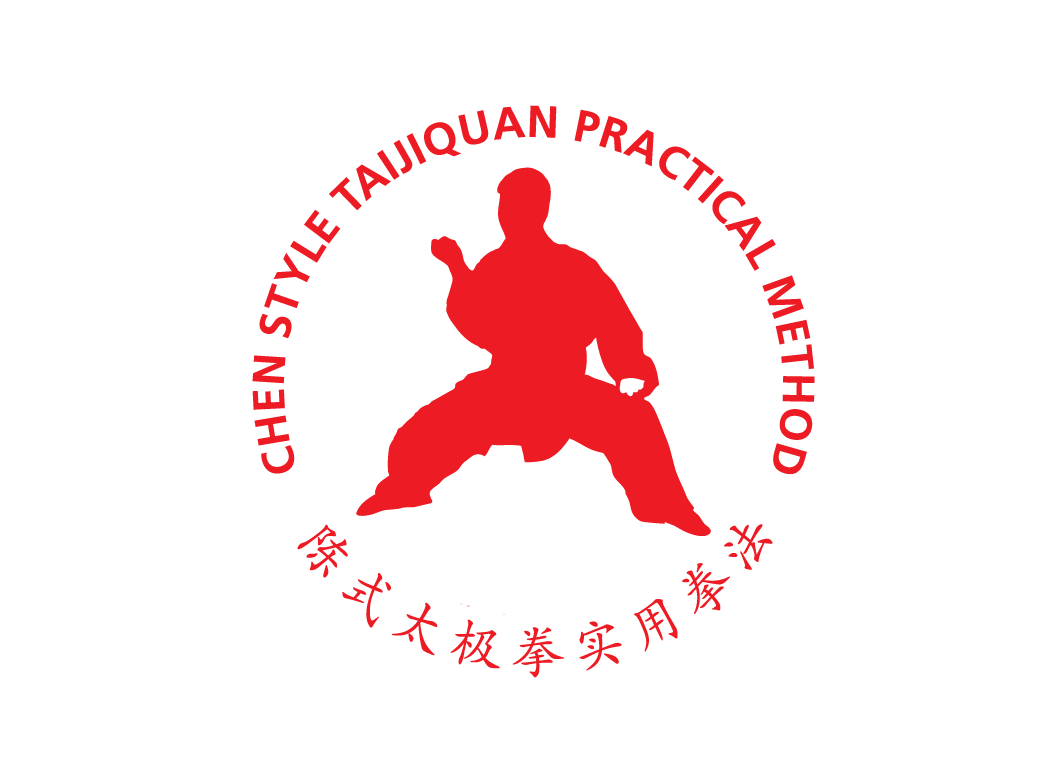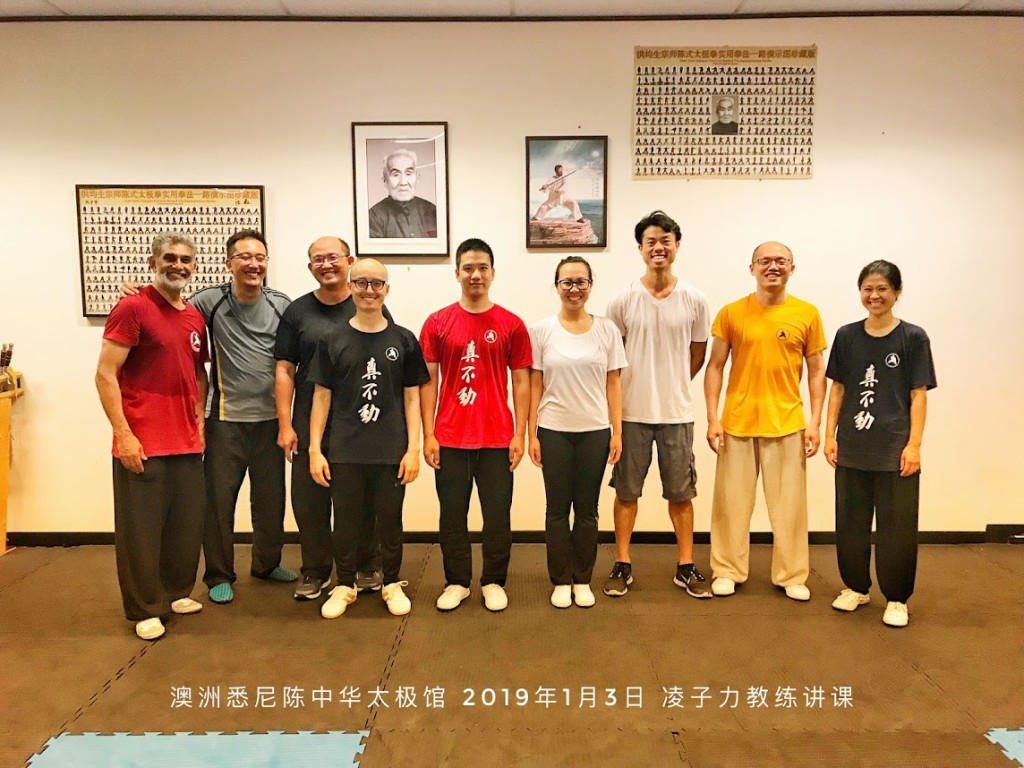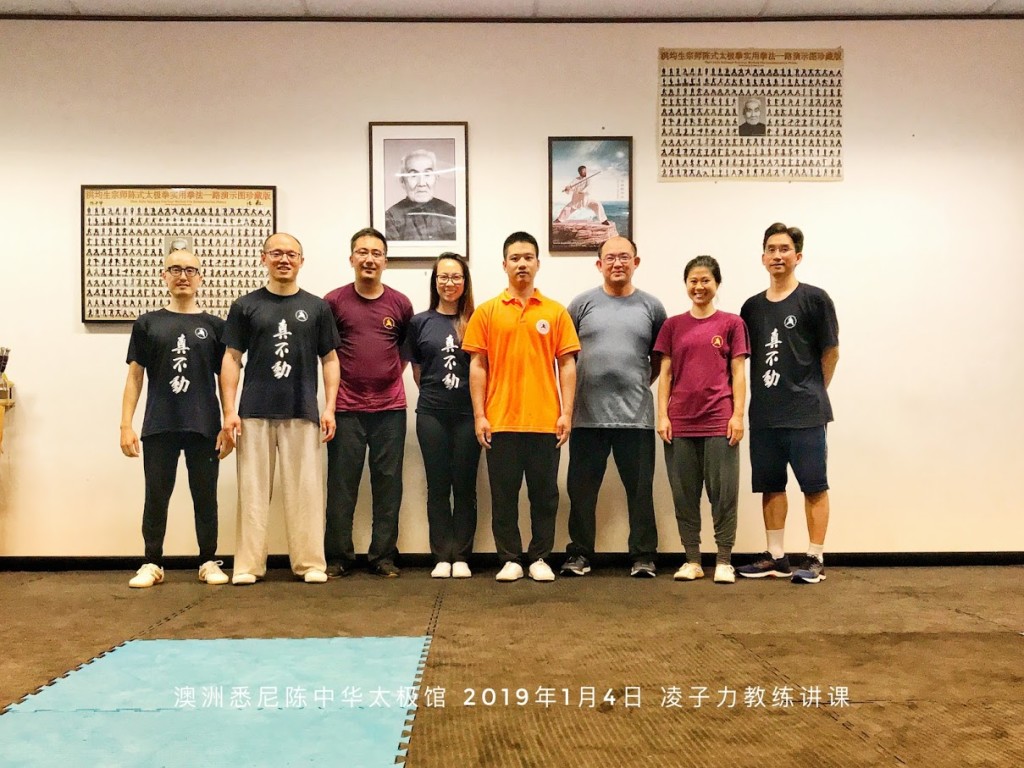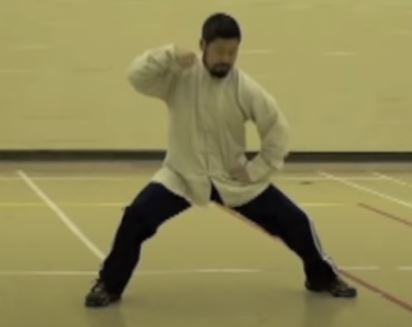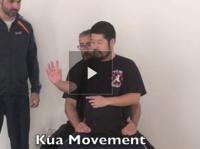In learning Taiji, Master Chen would often say that we create power with size and restriction. He would also say that we must develop the ability to separate every single part of our body. This includes left and right, top and bottom, front and back, and inside and outside. Read more
Brian Chung
Today Master Chen covered the Double Positive Circle.
Today, Master Chen covered Foundations and provided corrections on Twisting the Towel.
Master Chen demonstrated the Positive Circle today.
- For a while I had experienced tightness in the shoulder while performing Yilu. This is also apparent when practicing Basic Foundations, specifically in a three count Positive Circle right between Step 2 and Step 3.
- In a recent online lesson on 18th August 2020, an Master Chen gave an instruction on second count of the Positive Circle. Excerpt from Kelvin Ho’s notes http://practicalmethod.com/2020/08/64906/ In the 3-count positive circle: In with elbow, turn with kua, out with hand. When we do turn with (front) kua, the rear kua does not move. This action itself has already started to drive the hand out. When the front kua can’t go anymore, we open the armpit, and the rear knee while the rea kua is still not moving.
- After practicing according to this instruction by sequentially focusing on (1) opening the front kua, then (2) the rear knee and armpit. This completely changed my Basic Foundations and Yilu.
- When splitting in step (1), there is a clear ‘hit’ point where continuing the action beyond this will cause the front shoulder to get stuck, the chest will pop, and the torso will toss sideways.
- By locking in position at the ‘hit’ point and switching to open the rear knee and armpit without moving the rear kua, the split in step (1) is continued while the body itself remains stable.
-
Front Kua splits to
-
Rear Kua / Front Shoulder / Front Knee
-
Rear Knee / Front Elbow / Front Heel
-
Rear Heel / Front Finger / Front Toes
-
These moves are sequential.
-
What is done must be maintained. Nothing can be undone.
-
Overall there is only one outcome of splitting on the 45 degree line.
-
In each segmented step, the action is on a specific body part. In order not to break this action, the other body parts adjust in position without themselves moving.
-
Different body parts are used to complete the one action in a sequential order.
-
In the final step, the end result is that the power is on the front finger and rear heel.
Six Sealing Four Closing Notes – Master Chen Zhonghua Online Zoom Lesson – 27 Aug 2020 – Brian Chung i
Master and Kelvin Ho provided instructions and corrections on Six Sealing Four Closing today.
Six Sealing Four Closing – Kelvin Ho
– Hand does not move. Dantian initiates the action. Kua lines up with elbow. Rotate the dantian to push the kua out.
– To connect the rear leg through the kua to the front arm. We don’t want the upper body there.
– Create a line from the front arm to the rear foot.
倒手 Dao Shou
Master and Kelvin Ho explained, demonstrated and gave examples of Dao Shou.
Read more
Double Negative Circle Notes – Master Chen Zhonghua Online Zoom Lesson – 21 Aug 2020 – Brian Chung i
Master and Kelvin Ho provided instructions and corrections on the double negative circle. (1) Fist draping over body (2) Double push down.
Master gave a physical example: hold a stick to cross a door that is 3 feet wide and 6 feet tall.
Read more
Negative Circle Procedure Notes – Master Chen Zhonghua Online Zoom Lesson – 18 Aug 2020 – Brian Chung 1
Master Chen and Kelvin Ho provided instructions and corrections on the following Negative Circle procedure.
Basic Knowledge for learning
(1) Jiaodui: Re-calibration
(2) Dixian: Bottom line
(3)Can Zhaowu: Reference Points Read more
|
|
Practical Method Sydney 澳洲悉尼實用拳法Chen Style Taijiquan Practical Method 陈式太极拳实用拳法 |
The Sydney Chen Zhonghua Taiji Academy, also known as Practical Method Sydney, was officially established in 2012. Paul Janssens traveled to China to attend Master Chen Zhonghua’s three month full time training course on Daqingshan, after which he invited Master Chen to conduct workshops in Sydney and Canberra in 2012. Since then, Master Chen has conducted regular two day workshops in Sydney. These workshops have attracted many people from around Australia to learn from Master Chen.
Each workshop typically covers theory, foundations, Yilu (the first Taiji barehand form), applications and push hands. Practical Method is a system based on separation of yin and yang. The main concept is indirect power. The primary actions are in with elbow no hand, out with hand no elbow.
The Chen Zhonghua Taiji Academy headquarters is located in Daqingshan, Wulian, Shandong Province, China. International students train year-round on Daqingshan. Daqingshan holds one of the largest Taiji competitions in China annually.
Brian Chung, Master Chen Zhonghua’s 256th disciple, is an instructor for Practical Method Sydney. He has been teaching and promoting the Practical Method system in Sydney since 2018. He has received numerous medals in various Taiji competitions in Australia & China. He has completed over 20,000 Yilus and will continue to further his learning.
Classes and Practice Sessions:
Read more
| Instructors: | Master Chen Zhonghua |
| Date: | Feb 15-16, 2020 |
| Time: | 8:30am to 11:30am2:00pm to 5:00pm |
| Location: | DJKJ Kung Fu Academy 34 Rosebery Avenue, Rosebery NSW 2018 |
| Topics: | Theory, Foundations, form (Yilu), applications and push hands |
| Fee: | $380 for 2 days, $220 for 1 day. |
| Register: | http://bit.ly/PM2020Sydney |
| Suggested preparation for first-timers, get yourself familiar with the following: | |
|
|
| For further information, contact: Brian Chung practicalmethodau@gmail.com +61 423 035 857 |
|
|
Practical Method Sydney 澳洲悉尼實用拳法Chen Style Taijiquan Practical Method 陈氏太极拳实用拳法 |
| Classes: | Sunday 8:00am to 9:30am – Brian Chung No classes on all public holidays or long weekends |
| Curriculum: | Chen Stye Taijiquan Practical Method Foundations, Yilu (First Routine), Erlu (Second Routine), Theory, Push Hands |
| Location Details: | Bradfield Plaza, Broughton St at Pitt St, Kirribilli NSW 2061 |
| Instructor: | Brian Chung |
| Fee: | $310 per term.
Payment link: https://square.link/u/TXWAcYsF Schedule 2026: Term 1: 11 Jan to 29 Mar Term 2: 12 Apr to 5 Jul Term 3: 12 Jul to 27 Sep Term 4: 11 Oct to 20 Dec Privates are also available. |
| Contact: | For more information and registration, please contact: Brian Chung practicalmethodau@gmail.com +61 423 035 857 |
| Facebook Page: https://www.facebook.com/practicalmethodsydney |
2018.12.16 Sydney Workshop Day Two Notes – Brian Chung Read more
2018.12.15 Sydney Workshop Day One Notes – Brian Chung Read more
| Instructors: | Master Chen Zhonghua, Instructor Chen Xu, Instructor Ling Zili |
| Date: | Dec 15-16, 2018 |
| Time: | 9:00am to 5:30pm |
| Location: | DJKJ Kung Fu Academy 34 Rosebery Avenue, Rosebery NSW 2018 |
| Topics: | Theory, Foundations, form (yilu), applications and push hands |
| Fee: | $380 for 2 days, $220 for 1 day. |
| Suggested preparation for first-timers, get yourself familiar with the following: | |
|
|
| For more information and registration, please contact: Brian Chung practicalmethodau@gmail.com +61 423 035 857 |
- Coordination never occurs until there is something independent.
- Moving Step Positive Circle. The middle is independent. It cannot get involved.
- A move must be clear, don’t drag anything into it.
- Example of a mechanical typewriter – two keys cannot jam together.
- Example of a deer. Feet move, the body does not.
- Moving Step Exercises. (1) Positive Circle. (2) Grand Red Fist (Da Hong Quan) (3) Single Leg Grand Red Fist (Da Hong Quan)
- Shift Space. Master Chen demonstrated this on me. He covered four squares.
- To Issue. When you are issuing power, your opponent must bounce out on his own.
- Three Coin demonstration. Line up three coins on a table. (1) Rear Foot (2) You (3) Opponent. #2 does not move. When #1 hits #2, #3 is bounced out.
- Not moving water (Bu Liu Shui).
- All movements must be stable. Then add layers.
- Form Individual Move Exercises (1) Whip Wrapping Around the Body. (2) Jade Girl Works at Shuttles (3) Wild Horse Parts Its Mane
- There is no right or wrong. There is only the Dao.
- Just observe what’s going on and go with it.
- Only ideas are left, physical things we don’t care. (Chinese vs Western culture)
- The art must be at the centre. We are just a small part of it. When you place yourself at the centre, you will make changes.
- Always ask yourself: What was it that I was taught the first day?
- The teacher’s job is to sequence things.
- It has to be his doing, otherwise it’s not Taiji.
- If your method is the same, you can mirror.
- Analogy of a locked door (two rods) / open door (one rod).
- The one you don’t know what happened, that’s the right one.
- It cannot move. If it moves it cannot connect.
- Train your body to outmanoeuvre them, not pick on their vulnerability.
- When it rotates, time does not exist. Weight does not exist. Power does not exist.
- Master Chen said your form is not bad. You just need to fight a lot. Otherwise the form is just imagination.
2017.12.16 Sydney Workshop Day One Notes by Brian Chung
- The two buttocks and tailbone splits into a tripod. It will take sixty years to train. Do not believe you can do it.
- Alignment is everything goes through a bottleneck.
- When the Horizontal and Vertical dot meets, it becomes a three dimensional force field.
- Peng Energy.
- From nothing, to form. Once the energy is there, we do not need the form.
- Gong Fa. Quan Fa. Tui Shou (push hand). San Shou (free, loose). Duan Shou (broken).
- Foundations. Twisting the Towel. Fetch Water. Six Sealing Four Closing. Positive Circle. Negative Circle.
- Seven Inch Knife.
- Master corrected my Six Sealing Four Closing. He adjusted the orientation of my front kua and the direction of the front hand. He then emphasised the front kua / front shoulder rod.
- Master corrected my large Six Sealing Four Closing. The rear hand must be bigger.
- Your door can never be open.
- Master Chen demonstrated using a spear. The front hand is always pointing at your opponent.
- Double Positive Circle.
- Double Negative Circle.
- Movement must come from the line. The line cannot be part of the move.
- Twilight is at 12:00 and 6:00. Find these two dots and amplify them.
- Full. Cannot add, cannot take away.
- Essence, Qi, Spirit.
- We are doing a series of mechanical movements.
- Perceived power. It does not exist. But it does.
- Stepping side to side. The left foot, dantian, and right foot are three dots. Lock two dots, and move one.
- Horse stance.
- Lock dantian and R foot. Suck L foot in.
- Shovel out.
- Double Negative stepping out on a straight line.
- Double push down.
- Adjust front foot.
- Elbow in while turning 180 degrees.
- Shovel Out with hands on knees.
- Press on your rear knee, shovel out at 45 degrees.
- Shift to the middle.
- Press on your front knee, suck the rear leg in.
- So small there is nothing inside of it. So large there is nothing outside of it.
- Upper Dantian is also called the Ancestry Cavity. Zu Qiao. Middle Dantian is at the solar plexus. Lower Dantian is three fingers below the navel, three inches in.
- What is real cannot be named.
- Behind is ability, in front is function.
- If we have a question, write it down, then ask it after we are training. While we are training we must focus.
- Push hands about (1) how quickly you adapt to your opponent (2) how fast you make a decision.
- Experience cannot be replaced by theory.
- Entice into Emptiness.
- Story about Master Watermelon Peel.
- Story about Grandmaster Hong and moving the rock.
- Energy Training Exercise (Da Li Gong).

